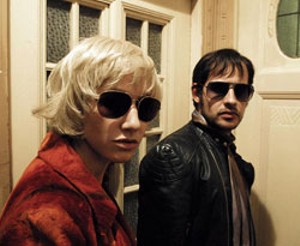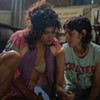Published September 30, 2009 at 11:22 a.m.
College students: There’s a film out there that has more bank heists and gunfights than Public Enemies, more stylish mayhem than Inglourious Basterds, and more nudity than both put together. Be warned, though, that it comes with a history lesson or two. You could even end up in an argument.
Was director Uli Edel wrong to take an ugly chapter in his nation’s past and turn it into a thrill ride? Maybe. But the fact remains, his film about the Red Army Faction, which fascinated and terrorized West Germany in the 1970s, is one of this year’s best action movies so far. Just don’t look for a hero.
Martina Gedeck (The Lives of Others) plays Ulrike Meinhof, a thirtysomething lefty journalist with two small children who evolves over the course of the film into a full-fledged “urban guerrilla,” engineering bombings and rationalizing them in the radical press. Moritz Bleibtreu and Johanna Wokalek play Andreas Baader and Gudrun Ensslin, the charismatic young arsonist couple who lure her into their cell. A whole slew of other revolutionaries show up in the 150-minute film, based on a book by journalist Stefan Aust.
Between them, the actors playing RAF members have as many fetching haircuts as an indie band and as many pairs of great cheekbones as a Milan runway. They’re always snappily dressed, whether for abductions, bank robberies or desert training in weapons handling with the PLO.
So does The Baader Meinhof Complex “glamorize terrorism”? It certainly doesn’t ugly it up. But, more importantly, Edel shows how the group glamorized and romanticized itself. He sets the scene carefully, so we understand why German college students in the late ’60s thought their country was heading down the fascist path again. “We have a historical responsibility” to prevent the rise of another Hitler, the cool blonde Ensslin tells an interviewer.
But as the group gains recruits and publicity, it also gains a certain cultish arrogance — personified by Bleibtreu as Baader, who seems to fancy himself a rock-star revolutionary. In the aforementioned sequence with the PLO, he shoots up the desert just for the hell of it, a waste of ammunition that horrifies the Palestinians. They don’t like the Germans’ miniskirts and nude sunbathing, either.
In scenes like these, Edel hints at the cultural obstacles to a global anti-imperialist movement. He also makes sure to show us the civilians bloodied, terrified and sometimes killed by RAF actions. Just before Meinhof participates in her first act of violence, we see her chat with a guard about his family. Later, after a melee in which the same guard is injured, she writes in one of her manifestos that it’s vital to draw a line between oneself and one’s enemies — to see them as agents of evil powers, not people.
But they are people. And as the film races from one kinetic scene to the next — sometimes tumbling them together in a montage — it gives the audience the choice of just enjoying the spectacle or considering its consequences. Like The Battle of Algiers, it sticks close to (fake) fly-on-the-wall tactics rather than imposing an interpretation. Only when Bruno Ganz appears as the canny, politically aware police chief Horst Herold do we approach something like an authoritative point of view.
Even when the script has the protagonists talking in Maoist soundbites, the actors render them as real people, rage and self-doubt flitting across their faces. That’s especially important in the last hour, when they learn that hell is sharing a prison cell with your revolutionary cell. What might have been a slog in a more staid historical film, here is compelling and, ultimately, chilling. Come for the action, stay for the talk.
Info:
More By This Author
Speaking of Movies, movie Review
-

Next Month Brings the Final Curtain for Palace 9 Cinemas
Oct 27, 2023 -

Book Review: 'Save Me a Seat! A Life With Movies,' Rick Winston
Aug 30, 2023 -

Steve MacQueen Named Executive Director of Vermont International Film Festival
May 22, 2023 -

Vermonters Are Going Back to the Movies — Under the Stars
Aug 26, 2020 -

Where to Catch a Movie Near Burlington
Sep 11, 2018 - More »
Comments
Comments are closed.
From 2014-2020, Seven Days allowed readers to comment on all stories posted on our website. While we've appreciated the suggestions and insights, right now Seven Days is prioritizing our core mission — producing high-quality, responsible local journalism — over moderating online debates between readers.
To criticize, correct or praise our reporting, please send us a letter to the editor or send us a tip. We’ll check it out and report the results.
Online comments may return when we have better tech tools for managing them. Thanks for reading.













































